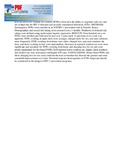Associations of sexual risk taking among Kenyan female sex workers after enrollment in an HIV-1 prevention trial.

View/
Date
2005-03Author
Yadav, G
Saskin, R
Ngugi, Elizabeth N
Kimani, J
Keli, F
Fonck, K
Macdonald, KS
Bwayo, JJ
Temmerman, M
Moses, S
Kaul, R
Type
ArticleLanguage
enMetadata
Show full item recordAbstract
BACKGROUND:
Female sex workers (FSWs) often lack the ability to negotiate safer sex and are at high risk for HIV-1 infection and sexually transmitted infections (STIs).
METHODS:
Seronegative FSWs were enrolled in an STI/HIV-1 prevention trial in Nairobi, Kenya. Demographics and sexual risk taking were assessed every 3 months. Predictors of reduced risk taking were defined using multivariate logistic regression.
RESULTS:
Four hundred sixty-six FSWs were enrolled and followed for just over 2 years each. A spectrum of sex work was apparent: FSWs working in night clubs were younger, charged more for sex, and used condoms more frequently; FSWs working from home were older, charged less, and used condoms the least; and those working in bars were intermediate. Increases in reported condom use were most significant and sustained for FSWs working from home and charging less for sex and were poorly maintained for bar-based FSWs. Self-reported lower condom use, higher client numbers, and alcohol use were associated with higher STI rates.
CONCLUSIONS:
Home-based FSWs and those charging less for sex used condoms the least at baseline but showed the greatest and most sustained improvements over time. Potential response heterogeneity in FSW subgroups should be considered in the design of HIV-1 prevention programs.
URI
http://www.ncbi.nlm.nih.gov/pubmed/15735453http://erepository.uonbi.ac.ke:8080/xmlui/handle/123456789/42304
Citation
Yadav G, Saskin R, Ngugi E, Kimani J, Keli F, Fonck K, Macdonald KS, Bwayo JJ, Temmerman M, Moses S, Kaul R; Kibera HIV Study Group;Associations of sexual risk taking among Kenyan female sex workers after enrollment in an HIV-1 prevention trial.;J Acquir Immune Defic Syndr. 2005 Mar 1;38(3):329-34.Publisher
College of Health Sciences,
Collections
- Faculty of Health Sciences (FHS) [10377]
